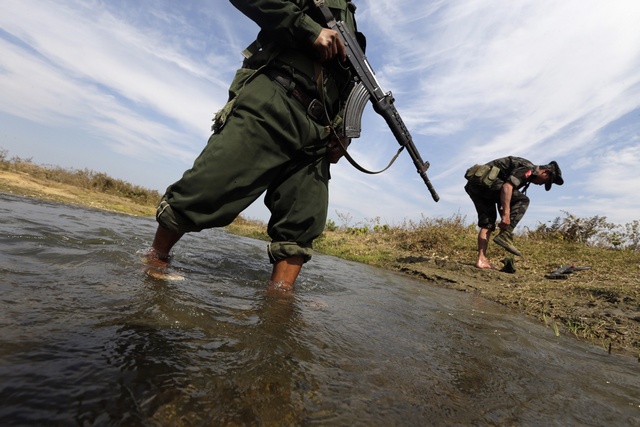The Kachin Independence Army (KIA), who is currently negotiating a precarious ceasefire deal with the government, has rejected a plea by opposition leader Aung San Suu Kyi to be formally invited to mediate talks between the groups.
In an interview with DVB, KIA spokesperson La Nan insisted they would not “directly or formally specify individuals based inside the country to join and assist the peace talks with the government,” including Suu Kyi.
Earlier this week the democracy icon offered to mediate talks between the parties in an effort to stave off criticisms over her silence on human rights abuses carried out by the Burmese army in the conflict-torn northern state. But she insisted that she would need to be formally invited to join the process.
“There have been questions and criticism directed at me over my non-involvement in the Kachin crisis. I’ve always been saying this – I do want to get involved and I am ready to take part in the process if I am wanted – I have officially stated this for a while,” she said in a speech marking Burma’s union day.
Union day celebrates the day her father, Aung San, successfully negotiated the historic 1947 Panglong agreement with the majority of Burma’s ethnic minority groups, which set the framework for a federal state. The military government later rejected the agreement.
But the Kachin leader cast doubt on Suu Kyi’s ability to mediate the process with impartiality as a member of parliament under Burma’s controversial 2008 constitution, which directly violates the 1947 agreement.
“Daw Aung San Suu Kyi currently has responsibilities as a representative in the lower house as well as for her democracy leader epithet. It’s contentious when a parliament representative is going to help mediate the situation,” La Nan said.
Some civil society groups have also expressed disappointment over her offer to act as a “neutral” mediator, according to Burma Campaign UK. “[Many ethnic groups] always thought they were on the same side as Aung San Suu Kyi, against a common enemy, and with a common goal, democracy and human rights,” said Mark Farmaner.
Suu Kyi has previously courted controversy for repeatedly proclaiming her “fondness” for the Burmese military, formed by her father, despite ongoing human rights abuses in ethnic minority areas, including Kachin state.
“She has to study more about the ethnic issue and the conflicts in Burma,” Moon Nay Li from the Kachin Women’s Association of Thailand told DVB. “Some issues she does not understand. She has to study the ethnic issue, including the Panglong agreement and what the ethnic people want.”
The KIA, who is fighting for greater autonomy and ethnic rights, has been locked in a bloody battle with government forces in northern Burma since June 2011, when a 17-year ceasefire broke down.
Emergency peace talks were held on 4 February, after Burmese troops stepped up its military assault using airstrikes and heavy artillery on the isolated rebel stronghold Laiza squeezed against the Chinese border. Analysts say the Chinese government fear an influx of Kachin refugees into their territories and have pressured the Burmese government to negotiate a swift ceasefire.
According to the Kachin Independence Organization (KIO) — the KIA’s political wing, the Chinese government was directly responsible for the latest peace talks. “KIO didn’t have direct contact with [government peace negotiator] U Aung Min for that – the Chinese government arbitrated the meeting. So we didn’t have time to invite the UNFC [the United Nationalities Federal Council] officials,” said La Nan referring to an umbrella organisation for ethnic groups in Burma.
But Dr Min Zaw Oo, who is a leading ceasefire negotiator and director of the Myanmar Peace Center, told DVB that the Karen National Union and the Restoration Council of Shan State – two leading ethnic groups who have recently inked peace deals with the government – played a key role in setting up the peace talks. Both groups acted as observers at last week’s talks held in the Chinese border town Ruili.
He also denied allegations that the government had excluded Suu Kyi from the ceasefire process. “There has been no rejection – as far as I understand the government has opened an opportunity for everyone to take part in the peace process.”
La Nan added that it would be the personal responsibility of Suu Kyi, and every other citizen, “to help solve the country’s political problems”. “We are not going to urge anyone to join but we welcome all individuals who see it as their responsibility to join the process.”
The KIA is due to meet again with the government and ethnic leaders, including the UNFC, in Chiang Mai in Thailand on 20 February in an effort to end hostilities. The Kachin have repeatedly called for a political solution, including self-determination based on the Panglong agreement, as a key provision for sustainable peace.
Additional reporting by DVB staff.



